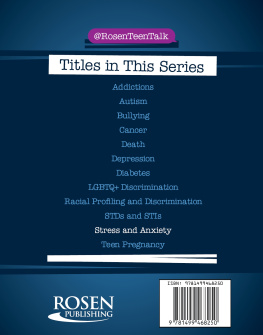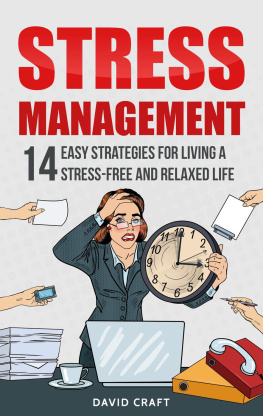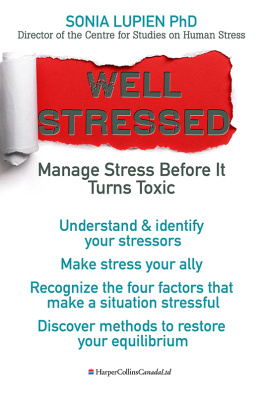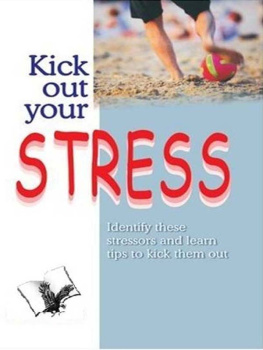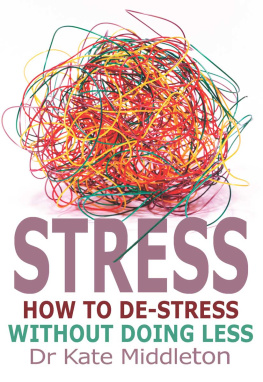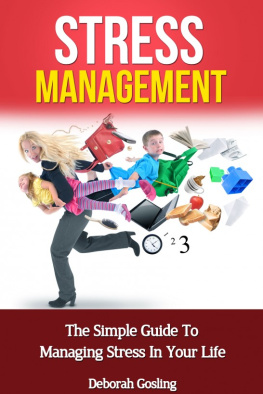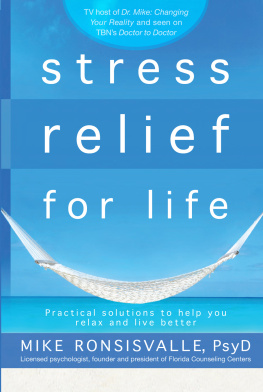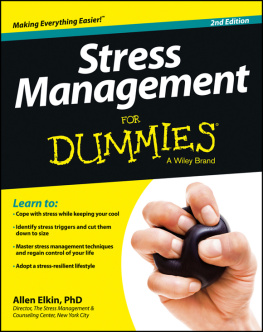Stress Management 101
10 Practical Steps For Conquering Everyday Stress And Getting Things Done
Daniel C. Kelly
Copyright 2020 - All rights reserved.
This document is geared towards providing exact and reliable information in regards to the topic and issue covered. The publication is sold with the idea that the publisher is not required to render accounting, officially permitted, or otherwise, qualified services. If advice is necessary, legal or professional, a practiced individual in the profession should be ordered.
- From a Declaration of Principles which was accepted and approved equally by a Committee of the American Bar Association and a Committee of Publishers and Associations.
In no way is it legal to reproduce, duplicate, or transmit any part of this document in either electronic means or in printed format. Recording of this publication is strictly prohibited and any storage of this document is not allowed unless with written permission from the publisher. All rights reserved.
The information provided herein is stated to be truthful and consistent, in that any liability, in terms of inattention or otherwise, by any usage or abuse of any policies, processes, or directions contained within is the solitary and utter responsibility of the recipient reader. Under no circumstances will any legal responsibility or blame be held against the publisher for any reparation, damages, or monetary loss due to the information herein, either directly or indirectly.
Respective authors own all copyrights not held by the publisher.
The information herein is offered for informational purposes solely, and is universal as so. The presentation of the information is without contract or any type of guarantee assurance.
The trademarks that are used are without any consent, and the publication of the trademark is without permission or backing by the trademark owner. All trademarks and brands within this book are for clarifying purposes only and are the owned by the owners themselves, not affiliated with this document.
Contents
Introduction
Hi, thank you for purchasing the book!
In this book Ive provided you with 10 scientifically proven steps to conquer your stress and get your things done. Do you consistently carry worries such as I need to hand in my project on this day!, Theres just so much work and theres no way I can do it all, or I must remember to do it! Or else... You might also have thoughts like What if I dont perform well? Or maybe you tend to have headaches or feeling that your stomach crutches quite often. I made sure to divide the steps into parts, from most important to least: Getting it out of your mind, immediate ways to radically reduce your stress, and additional ways to overcome your stress over the long term. Ive made sure to go over each step in depth in order for you to grasp its importance for overcoming your core reasons for feeling this way.
This short book contains practical steps for unleashing yourself from the binds that stress cause you to live in. The first section goes into how to release your mind from stress. This is the most important section since all of your stress starts from your mind and spreads from it. In the two other sections I go over how to release your body and spirit from stress in order for you to conquer yourself and your feelings, and eventually to make sure you live a life that you have control over. It is important for me to mention that I use these steps in my own life whenever I go through stressful periods so I know what Im talking about.
Enjoy reading!
Understanding What Is Stress And How It Works
What exactly is stress? Psychologically speaking, stress has historically been defined in two ways: stimulus-based or response-based. The stimulus-based definition of stress suggests that stress comes from pressure. The greater the pressure, the more stress you feel. We can all tolerate low levels of stress. Our brains would be pretty poorly designed if we couldnt! But there is a certain point when the pressure becomes too much, and your mind and body start to suffer under the strain. While stimulus-based stress builds primarily from external stressors, it can then also relate to internal stressors - a cumulative nature of stress. In other words, the build-up of many tiny stresses can be just as harmful as one big, traumatic event (Butler, 1993).
The response-based definition of stress, on the other hand, suggests that stress specifically comes from negative stimuli. This approach focuses less on what causes the stress, and instead focuses on the severity of your bodys reaction to stressors. This definition explains why something that might be exciting or even trivial to one person may be an extreme source of anxiety for another person. The ways in which the body responds to stress were first divided into three measurable stages by Hans Selye in the 1950s. According to his research, the first sign of stress in the body is what he called an alarm reaction (Selye, 1956). Today, we commonly call this the fight-or-flight response. Essentially, this is what happens when your brain registers a potential threat. Whether that threat takes the form of an oncoming train, a looming rent payment, or a gory scene in a horror film, your brain and body will respond in the same way. Once a threat is detected, your brain starts to produce different chemicals, and asks all of the systems of the body to be on high-alert so that you have the strength, energy, and alertness you need to deal with the situation. The stress response is, in theory, an amazing survival tool. It transforms us into superbeings, and heightens all of our senses in order to combat danger. But if you are in a constant state of stress, then the stress response never goes away. Your body never has the chance to go back to its normal rest-and-digest state, where you can relax.
If you sustain a fight-or-flight reaction long enough, your body goes into the second stage of stress, what Selye calls resistance (1956). In this stage, your brain is in conflict with itself. Your conscious mind knows that you are not in immediate danger, but your subconscious mind is not convinced. Unfortunately, its the subconscious mind that triggers and subdues the stress response. You may be able to convince yourself that everything is fine, but it takes a lot more than willpower to convince your body. This is the stage where you start to treat your stress in order to relieve it. But there are healthy and unhealthy ways to cope with stress. If we are not fully aware of what happens inside our body, we can easily fall into negative coping methods like anger, manipulation, or avoidance. If this resistance stage continues for too long, your body will enter the third stage, what Selye calls collapse or exhaustion (1956). It is at this point that you start to see physical or mental health problems appear, which are directly related to your stress.
We know now that both definitions of stimulus-based and response-based stress are useful and important. It is very important to know where your stress is coming from, but it is also important to understand why you respond to your stressors the way that you do. Your personality, life circumstances, past traumas, and sometimes your genetics all combine to determine what pressures cause you to feel stress and the methods you naturally reach for to cope with your stressors.
Stress is dependent on two factors: the demands being placed on you by the situation, and the resources that you have to meet those demands (Butler, 1993). If the situation asks you to do more than you are capable of, then you start to feel stress. The catch, however, is that demands and resources are not objective words. Unfortunately, stress is not based in reality, stress is based in how you personally perceive the situation. Your thoughts, attitudes, beliefs, and fantasies all combine to create a unique understanding of yourself and your situation. If you believe that you are not able to meet a challenge, or not capable enough to successfully navigate a situation, then you will begin to feel stress. This occurs even if your belief is unfounded or simply untrue. Stress, then, can be seen as a kind of relationship. A relationship between you and the world around you. Stress arises when something in your life, whether its another person, a bill, or a workload, drains you of all your resources and therefore puts you in danger. The danger of unemployment, divorce, or the inability to provide a good home for your children are all very real situations that can trigger your bodys stress responses. It could even be the threat of physical danger, like exhaustion.


